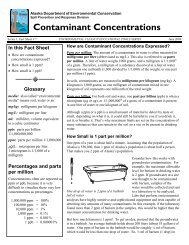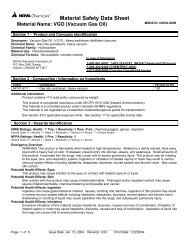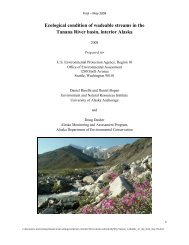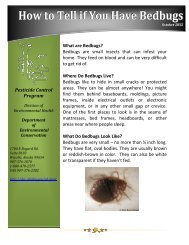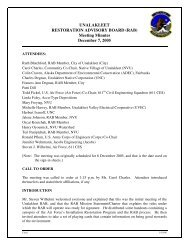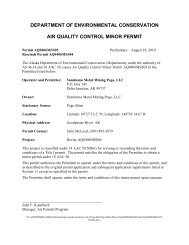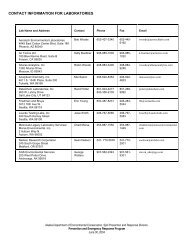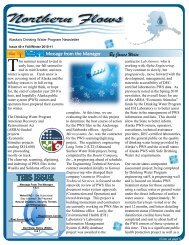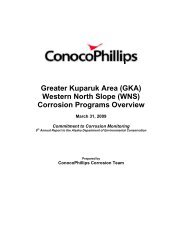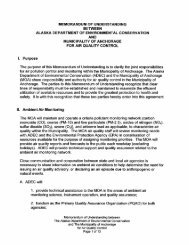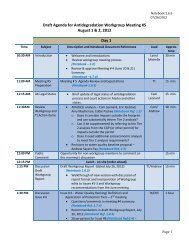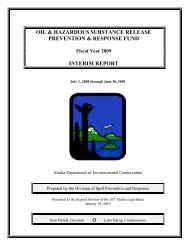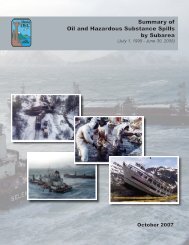2012 Ocean Ranger Guidebook Revision 3-7-12 - Alaska ...
2012 Ocean Ranger Guidebook Revision 3-7-12 - Alaska ...
2012 Ocean Ranger Guidebook Revision 3-7-12 - Alaska ...
You also want an ePaper? Increase the reach of your titles
YUMPU automatically turns print PDFs into web optimized ePapers that Google loves.
<strong>20<strong>12</strong></strong> <strong>Ocean</strong> <strong>Ranger</strong> <strong>Guidebook</strong> 3-7-<strong>12</strong><br />
Lithium batteries – These are used as a power source for flashlights and portable<br />
electronic equipment. All lithium batteries will be disposed of as hazardous waste, or<br />
sent out for reclamation.<br />
Alkaline batteries – These are common flashlight batteries and are also used in many<br />
camera flash attachments, cassette recorders, etc. They should be recycled, properly<br />
disposed or reclaimed.<br />
Handling Method Employed by Member Lines:<br />
Spent batteries are collected and returned for recycling and/or disposal in accordance with<br />
prevailing regulations. Discarded batteries are isolated from the refuse waste stream to prevent<br />
potentially toxic materials from inappropriate disposal. The wet-cell battery-recycling program is<br />
kept separate from the dry battery collection process. Intact wet-cell batteries are sent back to the<br />
supplier. Dry-cell batteries are manifested to a licensed firm for recycling.<br />
J. Bilge and Oily Water Residues: CLIA member lines have agreed to meet or exceed the<br />
international requirements for removing oil from bilge and wastewater prior to<br />
discharge.<br />
The area of the ship at the very bottom of the hull is known as the bilge. The bilge is the<br />
area where water collects from various operational sources such as water lubricated shaft seals,<br />
propulsion system cooling, evaporators, and other machinery. All engine and machinery spaces<br />
also collect oil that leaks from machinery fittings and engine maintenance activities. In order to<br />
maintain ship stability and eliminate potential hazardous conditions from oil vapors in engine and<br />
machinery spaces, the bilge spaces should be periodically pumped dry. In discharging bilge and<br />
oily water residues, both international regulations (MARPOL) and United States regulations<br />
require that the oil content of the discharged effluent be less than 15 parts per million and that it<br />
not leave a visible sheen on the surface of the water.<br />
All ships are required to have equipment installed onboard that limits the discharge of oil<br />
into the oceans to 15 parts per million when a ship is en route and provided the ship is not in a<br />
special area where all discharge of oil is prohibited. Regulations also require that all oil or oil<br />
residues, which cannot be discharged in compliance with these regulations, be retained onboard<br />
or discharged to a reception facility. The equipment and processes implemented onboard cruise<br />
ships to comply with these requirements are complex and sophisticated.<br />
The term “en route” as utilized in MARPOL (73/78) Regulation 9(b) is taken to mean<br />
while the vessel is underway. The U.S. Coast Guard has informed CLIA that it agrees with this<br />
meaning of “en route.”<br />
In accordance with MARPOL (73/78) Regulation 20 and as appropriate, US regulations<br />
(33CFR151.25), CLIA member lines have agreed that every cruise ship of 400 gross tons and<br />
above shall be provided with an oil record book which shall be completed on each occasion<br />
whenever any of numerous specified operations take place in the ship and that operations include:<br />
a. Ballasting or cleaning of fuel oil tanks,<br />
b. Discharge of dirty ballast or cleaning water from the fuel oil tanks above,<br />
c. Disposal of oily residues,<br />
d. And discharge of bilge water that accumulated in machinery spaces.<br />
141



